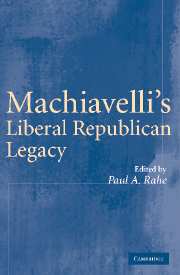Book contents
- Frontmatter
- Contents
- List of Contributors
- Acknowledgments
- Abbreviations and Brief Titles
- Introduction: Machiavelli's Liberal Republican Legacy
- Prologue: Machiavelli's Rapacious Republicanism
- PART I THE ENGLISH COMMONWEALTHMEN
- PART II THE MODERATE ENLIGHTENMENT
- PART III THE AMERICAN FOUNDING
- 7 The American Prince? George Washington's Anti-Machiavellian Moment
- 8 John Adams's Machiavellian Moment
- 9 Thomas Jefferson's Machiavellian Political Science
- 10 James Madison's Princes and Peoples
- 11 Was Alexander Hamilton a Machiavellian Statesman?
- Index
11 - Was Alexander Hamilton a Machiavellian Statesman?
Published online by Cambridge University Press: 24 July 2009
- Frontmatter
- Contents
- List of Contributors
- Acknowledgments
- Abbreviations and Brief Titles
- Introduction: Machiavelli's Liberal Republican Legacy
- Prologue: Machiavelli's Rapacious Republicanism
- PART I THE ENGLISH COMMONWEALTHMEN
- PART II THE MODERATE ENLIGHTENMENT
- PART III THE AMERICAN FOUNDING
- 7 The American Prince? George Washington's Anti-Machiavellian Moment
- 8 John Adams's Machiavellian Moment
- 9 Thomas Jefferson's Machiavellian Political Science
- 10 James Madison's Princes and Peoples
- 11 Was Alexander Hamilton a Machiavellian Statesman?
- Index
Summary
Many modern scholars of weight and stature seem to think so, as did a number of his contemporaries in the most heated debates of the founding era. Gerald Stourzh suggests that Hamilton followed Machiavelli in stressing the primacy of foreign over domestic policy. Both J. G. A. Pocock and Stourzh see Hamilton as an advocate of a military and commercial empire whose dynamic virtù posed a severe threat to republican virtue. Isaac Kramnick links Hamilton to the language of state-centered power (of imperium, potestas, gubernaculum, prerogative, and sovereignty) implicit in Machiavelli's Prince (but oddly enough, Kramnick says, not in the Discourses). Most recently, John Lamberton Harper has compared Hamilton's and Machiavelli's views on foreign policy more systematically than any scholar thus far. While the high degree of overlapping views between them justifies stressing Hamilton's kinship with the Florentine realist, Harper's omission of the liberal principles that also make Hamilton an anti-Machiavellian statesman is a common fault that this essay seeks to correct. In this book, Gary Rosen has suggested that Hamilton was a “republican prince” who tried to transform the new government under the Constitution of 1787 into what he thought it should be, thus allowing the end of the public good to triumph over the means of constitutional forms. Whereas Rosen leaves out the possibility that Hamilton's broad construction of the Constitution was the only practical means of preserving constitutional government under the stresses especially posed by the necessities and fortunes of war, Harvey C. Mansfield, suggests more accurately that (as Publius) Hamilton partook in the modern effort to tame Machiavelli's prince without declawing him.
- Type
- Chapter
- Information
- Machiavelli's Liberal Republican Legacy , pp. 254 - 278Publisher: Cambridge University PressPrint publication year: 2005

